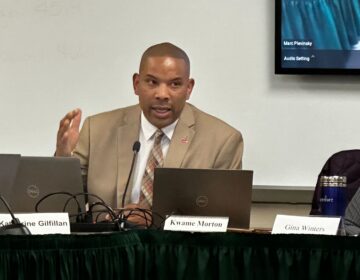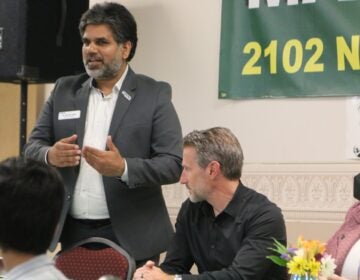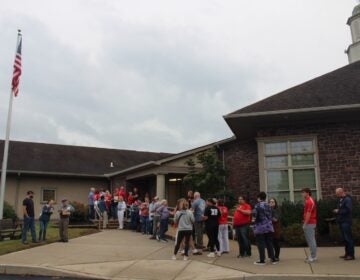Creating a Philadelphia school board we can trust
The dynamic of mistrust can’t be blamed exclusively on SRC process. For decades, we have had a public school system that has failed people of color and low-income communities.

Douglas Leach, teacher and graduate of Lincoln High School, holds up a sign at a rally ahead of a School Reform Commission meeting in November. (Bastiaan Slabbers for WHYY)
I find education politics endlessly fascinating. Nonetheless, School Reform Commission meetings long ago became a painful spectacle. And I witnessed nearly every one, because of my job, from 2001 to 2016. The experience has given me a clear perspective about what must be different about Philadelphia’s new school board if “local control” is to live up to its promise.
It’s tempting to believe that a locally controlled school board will bring on a new day in city schools. But that is by no means guaranteed.
Promise of local control a challenge
The advantages of going local seem a no-brainer. The new board will have nine members who are fellow residents of the city. Appointed by the mayor, they will likely identify more closely with the progressive politics of the city — valuing diversity and equity, pro-immigrant, friendly to LGBTQ people, concerned about poverty — than did some past SRC appointees. All that could make it feel less like a hostile takeover by outsiders, which was a feeling among locals from the SRC’s earliest days.
But with “local control,” many expect that the new board will function in a democratic, responsive, and accountable manner, even though it’s appointed rather than elected. Fulfilling that expectation will be challenging. The SRC has had many commissioners from Philadelphia who were committed public servants — the current commissioners live in the city — and yet that body never acted like it saw itself as accountable to the people of Philadelphia.
The new board should not mimic SRC processes, which from Day One have been opaque. We rarely get to see how the sausage is made. The public receives only short summaries of resolutions, without details or rationale. The commission, encouraged by its attorneys, makes liberal use of executive sessions to meet in private. In public meetings, it has not been the norm for SRC members to explain their votes, let alone hash out their differences openly.
The dynamic between commissioners and attendees at SRC meetings has been tense. The presence of police doesn’t help. All meetings are at 440 N. Broad St. — never out in the community. Commissioners typically rush to the public meeting from their executive session. Mingling with the crowd must wait until after the hours-long meeting.
Back and forth between SRC members and public speakers is minimal. (One current commissioner often disappears for this part of the meeting.) Passionate speeches are commonly received with stony silence from the front of the room. It’s a setup for anger and mistrust. Speakers raise their voices; commissioners become more stonefaced. All this must change.
Understanding a troubled history
But the dynamic of mistrust can’t be blamed exclusively on SRC process; there were problems back in the era of local school board too. For decades, we have had a public school system that works only for some, and, by any measure, it has failed communities of color and low-income communities in the city. Underfunding creates profound challenges for the educators working in our schools, and sometimes they blame the families they serve rather than allying with them. Public mistrust of the school system and those in charge is deep-seated and rational.
The mayor, his educational nominating panel, and the new board members will need to understand this troubled history and start acting differently for a more responsive, transparent, and democratic culture to take hold. Start with the nominating process: That should be as open as possible — disclosing who are the candidates, who nominated them, and what are their credentials and beliefs, while providing channels for public feedback.
For prospective board members, knowledge of education, school systems, budgets, and politics is important. The concerns of Philadelphia’s professional class are sure to be heard, so the mayor and nominating panel should prioritize nominees who can represent the issues facing the city’s disadvantaged and marginalized youth in low-income communities and communities of color. These nominees must welcome engagement with the public both during and outside of board meetings.
Building trust and unity
Even if it is more transparent and responsive, the new board will face another challenge in building a culture of trust. Our city and education community have become highly polarized around the issue of charter schools. This divide isn’t going to be resolved overnight. But a first step would be to reject the free-market approach embraced by the School Reform Commission — constantly opening new schools, thereby forcing others to close, like these were restaurants — with parents expected to hunt down schools with high ratings. This approach assumes there will be winners and losers. The competition is tearing schools and communities apart.
Instead, our city and its school system, under local control, should unite to focus community energy and creative talents on ensuring that the public schools we now have serve all their students well.
—
Paul Socolar was a founder of the Philadelphia Public School Notebook newspaper and was its editor from 1999 (when there was still a local school board) until 2016. The Notebook is a WHYY content partner.
WHYY is your source for fact-based, in-depth journalism and information. As a nonprofit organization, we rely on financial support from readers like you. Please give today.




